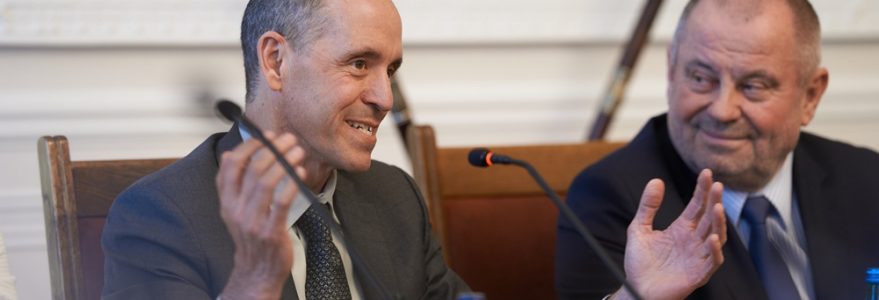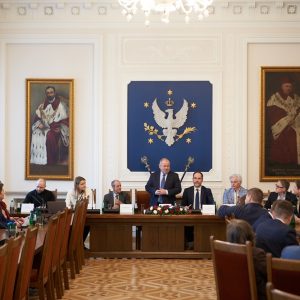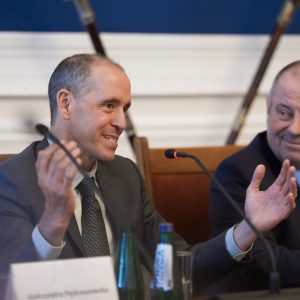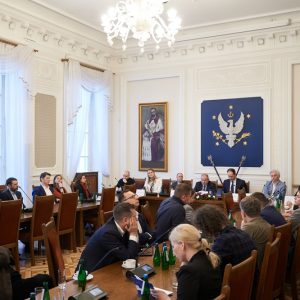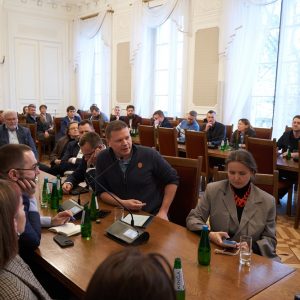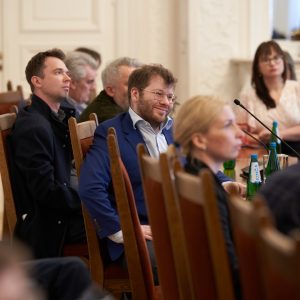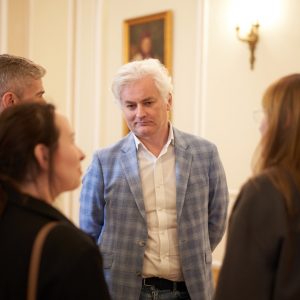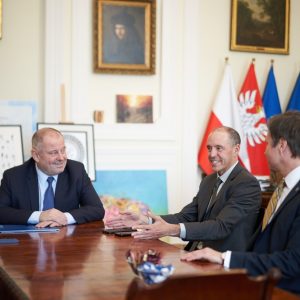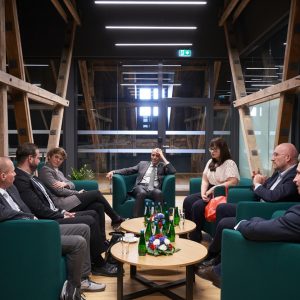Poland’s potential in artificial intelligence-based technologies was the topic of debate held at the University of Warsaw. One of its participants was Christopher Lehane, Chief Global Affairs Officer at Open AI.
On 8th April, representatives of the UW authorities, artificial intelligence researchers, as well as representatives of state authorities and AI (Artificial Intelligence) technology companies met in the UW Senate Hall to discuss the development of artificial intelligence in Poland.
The conversation covered topics such as the legal environment for the development of artificial intelligence in Europe and around the world, the attitude of societies towards AI, the training of personnel developing AI-based technologies, as well as ways to finance and invest in AI development.
“Artificial intelligence is the basis of many business activities and also affects society. That’s why it is important to talk about the good things it brings and the challenges it poses to the world,” said Prof. Alojzy Z. Nowak, the UW Rector who opened the panel discussion “Entering the Age of Intelligence: Ulocking the Poland’s Potential with AI”.
“The University of Warsaw is increasingly seen as a European innovation hub. The meeting with OpenAI representative Chris Lehane confirms that world leaders recognise the potential of our employees, students and R&D facilities. We are ready to co-create a future based on artificial intelligence, one whose applications may soon redefine the Polish economy. Our mission is to build bridges between basic research and practical innovation. OpenAI is a natural partner for us on this path, with whom we want to create technologies that serve people and society,” Robert Grey, the UW Chancellor, said during the meeting with OpenAI representatives.
AI research and knowledge
“It’s hard to predict exactly how artificial intelligence will affect scientific discoveries and company operations. I like to compare the age of artificial intelligence to the complete beginnings of the emergence of the automobile industry. Back then, it was also impossible to predict how and where development would end up, and what state-of-the-art cars would look like. We are now in a very similar place in terms of the development of artificial intelligence,” Prof. Piotr Sankowski from the UW’s Faculty of Mathematics, Informatics and Mechanics, said. “We should invest in basic research and look very closely at the new ideas that scientists are proposing,” the scientist emphasised.
“I can assure you that the University of Warsaw is proud of the research in artificial intelligence that is being conducted here, and of the students who are engaged in this subject. We will do everything to support artificial intelligence and the development of information sciences, as they will shape the development of the world in the next few decades,” the UW Rector said.
“In the field of artificial intelligence research, the University of Warsaw is a very competitive institution, and one of the leading ones in Europe. UW alumni are working with OpenAI, and I hope that this cooperation will continue to grow,” the Rector added.
Artificial intelligence and talent
The guest speaker at the panel discussion and meetings with the UW authorities was Christopher Lehane, responsible for global policy at OpenAI.
“Poland’s voice in the discussion on artificial intelligence is very important. More than 20% of Poles use ChatGPT. Poland is a country that pays particular attention to the digital economy. In addition, Poland currently holds the presidency of the Council of the EU, and the Union itself is at a moment that will decide what the framework of public policies will look like in the coming years,” Christopher Lehane said. “The infrastructure of artificial intelligence consists of energy, chips, data and talent. Talented people are what bring Poland and OpenAI together,” he added.
The panel discussion was attended by Prof. Alojzy Z. Nowak, Rector of the UW, Prof. Piotr Sankowski from the UW, Christopher Lehane, Chief Global Affairs Officer at Open AI, Ignacy Niemczycki, Secretary of State in the Chancellery of the Prime Minister, Aleksandra Pędraszewska from ElevenLabs and Bartek Pucek from Pucek.capital.



